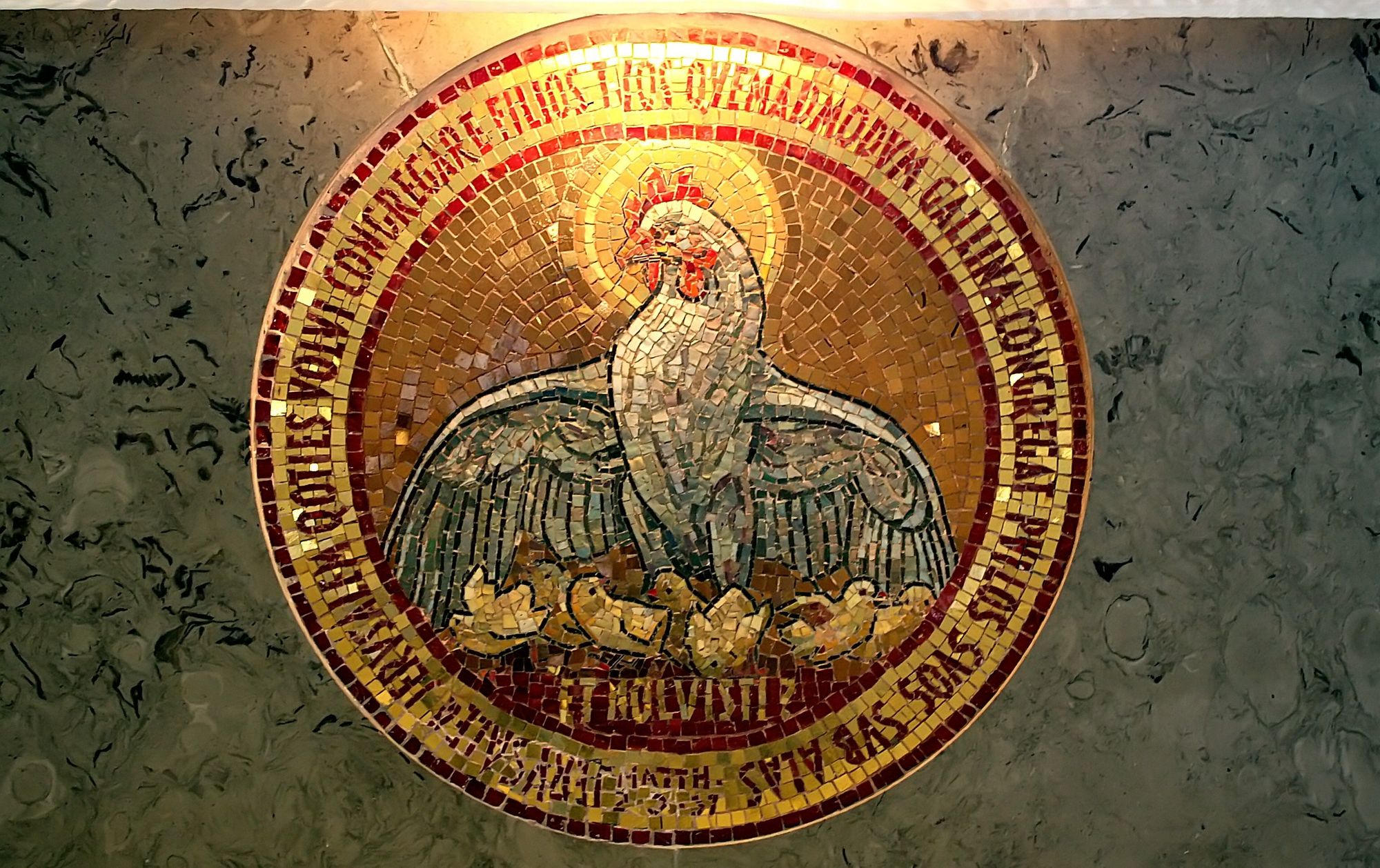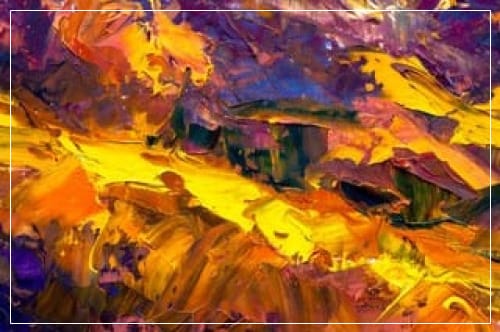As a hen gathers her brood under her wings

In Luke 19, during his final journey up to Jerusalem, Jesus sees the holy city from the Mount of Olives and begins to weep because of its lack of knowledge about the things that make for peace and its impending destruction. I too have visited with seminarians and pilgrims the traditional site of this event. The church, Dominus Flevit ("The Lord wept" in Latin) commemorates the location. As you can see in the picture above, a modern Roman Catholic church is located on the western slope of the Mount of Olives and provides a beautiful overlook of Jerusalem. When you stand in the church, you are able to peer through the glass and see the Old City. It's a favorite moment for me during our pilgrimages.
I may try to imagine the ancient city during Jesus's time, but I'm inspired most by the current view today. When you stand in the church today, you can see the metal cross near the altar in the foreground and the Dome of the Rock in the background. Two holy symbols from two different religious traditions. Placed side by side, they encourage us to imagine their relationship. Jerusalem, in fact, creates these moments regularly for pilgrims today. The sacred sites of three world religions share and compete for space, jostling with each other and creating theological and political juxtapositions at every turn. When I stand in this Christian church and look out to the Dome of the Rock, I offer a prayer for the things that make for peace. And I celebrate the diversity present in my current gaze.
But look closer at the picture above. Notice the circular mosaic on the front of the altar. There's a close-up picture just below. It's a hen with her baby chicks gathered around her! It's an image from our Gospel Reading this week.

In Luke 13, Jesus compares his desire for Jerusalem's children to a mothering hen.
"Jerusalem, Jerusalem, the city that kills the prophets and stones those who are sent to it! How often have I desired to gather your children together as a hen gathers her brood under her wings, and you were not willing!"
Jesus wishes to be a nurturing and protective mother to the people of Jerusalem. He wishes to gather them together, but they are known for killing prophets.
Dr. Ruth Anne Reese in her commentary notes,
He [Jesus] characterizes the city as killing prophets and apostles (“those who are sent,” Luke 13:34), but his response is the compassion of a mother. Jesus longs to gather Jerusalem under his wings (v. 34). Jesus longs to comfort those who would reject him. He envisions Jerusalem as a brood of vulnerable chicks in need of their mother’s protection and longs to offer the same protection, salvation, to the very city where he will die.

Confessional Prayer for Lent
By Rev. Lauren Jones Mayfield
Call to Confession
In all humility, in our full humanity, in our earthy dustiness, we turn to the God of Love, to the God who loves each of us so fully that God sent God’s child to become human and dusty, too. We pray to this earthy, earthly God, the God who is so close to us.
Prayer of Confession
(adapted from Calvary Baptist Church, Waco, Texas)
For our narrow vision and thinking we are not enough,
For not taking risks but choosing comfort,
For the masks we wear, which hide us from one another and from you,
We pray to the Holy One, O Lord, forgive us. We are dust.
For trusting the praise of others more than your assurances,
For being busy rather than being present,
For seeking recognition more than humble kindness,
We pray to the Holy One, O Lord, forgive us. We are dust.
For our over-consumption of resources rather than stewarding them with care,
For enacting harm to your earth with pollution, resource depletion, and extinction,
For manipulating your gifts to our benefit so that others experience loneliness,
We pray to the Holy One, O Lord, forgive us. We are dust.
For struggling to love those closest to us: our partners, parents, children, siblings, and friends,
For struggling to love those distant from us: our enemies, the poor, and even our neighbors,
For wanting to be right more than kind,
We pray to the Holy One, O Lord, forgive us. We are dust.
For not amplifying the voices of those on the margins of society,
For speaking out of our privilege, when we could hold silence,
For choosing silence, when we are called to speak,
We pray to the Holy One, O Lord, forgive us. We are dust.
For complacency and complicity in the systemic violence of poverty, mass incarceration, gun violence, racism, homophobia, transphobia, abuse, war,
For the personal violence in our hearts: hate, envy, discontentment, doubting our belovedness,
For our participation in the public violence that institutionally oppresses creation and limits community,
We pray to the Holy One, O Lord, forgive us. We are dust.
For lack of compassion,
For our disembodiment,
For neglecting joy,
We pray to the Holy One, O Lord, forgive us. We are dust.
For not thinking, feeling, or healing with grace,
For our ignorance, our striving, or our apathy, which all lead us to suffer,
For the ways we try to save ourselves and one another, rather than accepting salvation from you,
We pray to the Holy One, O Lord, forgive us. We are dust.
And, God, for all that which seems too big, too burdensome, too scary, too painful, or too embarrassing to name, we confess in silence….
We pray to the Holy One, O Lord, forgive us. We are dust. Amen.
Assurance of Pardon
Dust-laden, Friends, there is always Good News, even in our frailty, especially in our frailty. And it’s this: God created us for love because God is love and God loves us. Therefore, we are not alone, but we join in the great cloud of witnesses to uphold and embody and welcome others into this inclusive, liberating love. Through grace, you are forgiven.

Genesis 15
Genesis 15 tells of a covenant between God and Abram. Abram is promised many descendants and land. He is the focus of God's concern and reassurance in the chapter. Did you notice that another figure appears in the chapter? No, it isn't Sarai; she doesn't have a role in this chapter.
But, did you notice the figure of Eliezer in the story? You might ask: Who's that? He's a slave in Abram's household, but of little concern to the patriarch. In fact, his brief mention sets in motion God's promise to Abram that Abram will have descendants as numerous as the stars.
Genesis 15:2-3 says,
But Abram said, “O Lord God, what will you give me, for I continue childless, and the heir of my house is Eliezer of Damascus?” And Abram said, “You have given me no offspring, and so a slave born in my house is to be my heir.”
Eliezer receives only a passing reference before God makes a covenant with Abram and promises him both descendants and land.
Dr. Justin Reed provides commentary on this passage at the Working Preacher website. Justin centers his thoughts on the often ignored figure of Eliezer.
"I wish that childless Abram would develop a special connection with Eliezer whom he describes as fatherless. They could complement one another well. It would be nice if God pointed this out to Abram, but that is not what happens in this passage. God seems to conform to Abram’s degrading worldview."
Abram seems to be concerned both about his childless status and the fact that his slave might inherit his property.
Justin connects this passage to the larger biblical narrative:
"Abram thought of slavery as a sign of inferiority that should disqualify someone from inclusion in God’s special lineage. But Abram’s descendants will endure harsh slavery and come to understand it as central to their own identity. God does not make enslavement an immediate circumstance for Abram’s children, but enslavement, perseverance through it, and salvation from it become the banner of God’s people."

Prayers for Ukraine
The people of Ukraine have been in our hearts for several weeks now. The United Church of Christ leadership offers this prayer for Ukraine:
Holy God,
Hear our prayers for all those who will die today because of war in Ukraine and other war-torn countries all over this world. Grant them an end to the suffering of this world and eternal peace that is only found in You.
We pray for the people of Ukraine, Russia, and all nations — that war and bloodshed can be avoided and a new, just peace can be forged out of this crisis. We ask God grant wisdom to the leaders of nations, calling them to end provocation on all sides and invest instead in “the things that make for peace” as called for in all our faith traditions (Luke 19:41-2).
We pray for an end to the deep insecurity and mistrust on all sides, and call on leaders to build trust, based not on military might or alliances, but on the basis of our shared future and common humanity. Now is a time in which past harm should be acknowledged and addressed, and new partnerships can be envisioned.
We pray for and call on our leaders to have the courage to take small, verifiable, and independent steps toward peace, inviting others to reciprocate. Now is time to invest in conflict resolution, diplomacy and international cooperation — not more weapons which only escalate tension in the region.
Be with those suffering in ways that we cannot.
Protect them from devastation in ways those positioned in authority will not. Shield and comfort them as they confront the terror of violence that surrounds them. Hold them close to your heart and stay the hand of the enemies against them. Give us the courage and the strength to cry aloud against wickedness in high places that dare to harm others made in your image.
Comfort the children and heed their cries to be saved from harm in this world.
Make us a people who love our children, all of our children, more than we love greed, power, and control. Overturn governments of tyranny wherever they are found. Disrupt the intentions of evil and give us power to stand against demonic forces of greed and control. Grant that peace and justice come to warring nations by the hands of those courageous enough to stand and study war no more. Let Thy kin-dom come on earth as it is in heaven, we pray.
In Jesus’ name, Amen.

A Benediction (Or Miscellaneous Thoughts)
- This Sunday's psalm is Psalm 27. Here's a chant:
2. If you know someone who might like to read this newsletter, forward this email to them.
3. You can read an online version of this newsletter here.





Member discussion